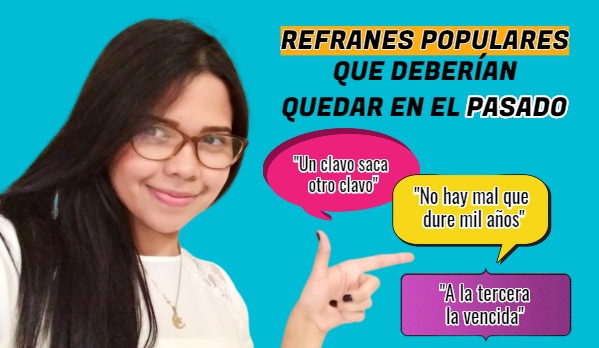¡Hola, amigos de Hive!
Hoy quiero tocar un tema que generación tras generación se refuerza o paradójicamente, pierde su vigencia: los refranes, sí, esas frases que nos seguirán a lo largo de nuestra existencia, esconden una moraleja y que pretenden guiar nuestra vida de una forma “correcta”.
Hello Hive friends. A pleasure to greet you!
Today I want to touch on a topic that generation after generation reinforces or may lose its validity: the sayings, yes, those phrases that will follow us throughout our existence, hide a moral and try to guide our life in a "correct" way.

Generalmente nuestros abuelos o padres nos decían algo, y acto seguido lanzaban el dicho para que uno se echara cabeza con esas palabras, y en parte, sí lo lograban con esa sabiduría milenaria, pero hoy las cosas han cambiado y no necesariamente esas profecías tienen que cumplirse. Entonces, aquí voy con algunos dichos que a mí juicio deben ser replanteados:
Generally our grandparents or parents would tell us something, and immediately afterwards they would throw the saying so that one would take their heads with those words, and in part they did it with that ancient wisdom, but today things have changed and not necessarily those prophecies have to be fulfilled . So, here I go with some sayings that in my opinion should be rethought:
1.Es mejor malo conocido que bueno por conocer: Me parece que este refrán es el más errado de todos porque indica que la gente debe quedarse con lo ya conocido, y no con lo que está por venir, es como si no llegara nada bueno y lo mejor sería resignarse a lo que tuviste. Ejemplo, te quedas en una mala relación, y no esperas anhelar algo mejor , o continuas en un trabajo que no te gusta, porque estás en tu zona de confort. ¿Las cosas pueden ser mejor que ahora? ¡Por supuesto que sí!
1.It is better known bad than good to know: It seems to me that this saying is the most erroneous of all because it indicates that people should stay with what is already known, and not with what is to come, it is as if nothing good came and the best thing would be to resign yourself to what you had. Example, you stay in a bad relationship, and don't expect to yearn for something better. Or continue in a job that you do not like, because you are in your comfort zone. Can things be better than now? Of course yes!

2.No hay mal que dure mil años: éste también deja todo en manos de la resignación, a que los problemas se solucionen con el paso del tiempo en lugar de accionar y buscar respuestas ante algo que nos aqueja. A veces el optimismo nos nubla el panorama real, y preferimos dejar las situaciones al azar sin preguntarnos qué estamos haciendo para que ese "mal" no dure tanto tiempo. No viviremos cien años, señores ¡hay que moverse!
2.. There is no evil that lasts a thousand years: this also leaves everything in the hands of resignation, so that problems are solved over time instead of acting and seeking answers to something that afflicts us. Sometimes optimism clouds the real picture, and we prefer to leave situations to chance without asking ourselves what we are doing for this "evil" that does not last so long. We will not live a hundred years, gentlemen, we must move!
3.Un clavo saca otro clavo: este refrán parece estar enmarcado en el tema de parejas y relaciones, creo que es el que ha hecho daño a más de uno, especialmente a quienes intentan evadir sus duelos y procesos. Considero que el único clavo que puede sacar el otro es el amor propio y autocompasión. Además, sería cruel y lamentable fungir como el clavo sustituto, ¿no creen? Así que no apliquemos ese dicho, no nos hagamos los locos con este punto, por favor.
3.A nail removes another nail: this saying seems to be framed in the topic of couples and relationships, I think it is the one that has hurt more than one by evading their duels and processes. I consider that the only nail that the other can remove is self-love and self-pity. Also, it would be cruelly and sadly to act as the substitute nail, don't you think? So let's not apply that saying, let's not be crazy about this point, please.
.png)
4.A La tercera la vencida: a la cuarta, a la quinta, a la décima, a las veces que uno pueda seguir insistiendo hasta obtener los resultados que deseamos sin darnos por vencidos. Nuestras luchas no deben ser contadas, sino bien trabajadas así fallemos en varias ocasiones ¡Ánimo!
4.To the third the expired: To the fourth, to the fifth, to the tenth, at the times that one can continue insisting until obtaining the results that we want without giving up. Our struggles should not be counted, but well worked so that we fail on several occasions. Cheer up!
Ok, estos serían los únicos dichos que no riman tanto con mi vida, es solo mi opinión y mi punto de vista; por eso me gustaría conocer el tuyo. Cuéntame en los comentarios, quiero leer qué no te cuadra de los refranes populares y el porqué.
Ok, these would be my sayings that don't rhyme so much with my life, it's just my opinion and my point of view; that's why I would like to know yours. Tell me, I want to read what does not fit you of the popular sayings in the comments.
Congratulations @paogcv! You have completed the following achievement on the Hive blockchain and have been rewarded with new badge(s) :
You can view your badges on your board And compare to others on the Ranking
If you no longer want to receive notifications, reply to this comment with the word
STOPSupport the HiveBuzz project. Vote for our proposal!
Si el río suena es porque agua lleva...
Creo que estamos en una época en donde los chismes y las redes sociales muchas veces provocan que las personas se dediquen a inventar muchos rumores.
Un abrazo.
Hi @paogcv I believe that no matter what the saying is, each person interprets it differently and applies it differently to their own situation. There is no one size fits all.
Thanks for sharing your thoughts on this. Nice to meet you.